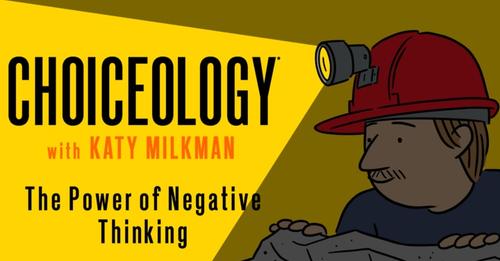Anticipating and planning for obstacles can sometimes be more powerful than adopting a positive mindset.
After you listen
Risk management is one of the most important parts of financial planning, but there are some possible outcomes that are especially unpleasant to think about. One of these is cognitive decline as we age.
- On the Financial Decoder episode titled “How Can You Prepare for the Perils of Aging?” Mark Riepe and his guests discuss how to take the right steps to protect your finances in the future.
A positive attitude is important when embarking on any new endeavor. However, as you may have heard in previous episodes of Choiceology with Katy Milkman, overoptimism also can blind you to important information.
In this episode, we look at a strategy that can help counteract the effects of overoptimism and overconfidence. You could call it the power of negative thinking.
We begin with the amazing story of a lake in Louisiana that completely disappeared in a matter of hours. An oil drilling accident in 1980 created a giant sinkhole in Lake Peigneur that rapidly drained massive amounts of water into an active salt mine, swallowing several boats and barges and large chunks of land in the process. The event was catastrophic, but no lives were lost, thanks in part to robust emergency planning.
You’ll hear first-hand accounts of the dramatic event from Michael Richard, Sr., whose family owns and operates a garden and a nursery on the shores of Lake Peigneur, and from Dr. Kelvin Wu, who describes the scene in the salt mine as the disaster unfolded.
Dr. Kelvin Wu is a retired mining engineer and former chief of the Mine Waste & Geotechnical Engineering Division at the Mine Safety and Health Administration.
Michael Richard, Sr., owns and runs Rip Van Winkle Gardens and Live Oak Gardens on Lake Peigneur, Louisiana.
Emergency planning played an important role in the outcome of this disaster. But planning for the worst needn’t be limited to life and death scenarios.
Annie Duke joins Katy to argue that negative thinking—imagining failure in order to manage or prevent it— can actually help improve the odds of success when planning anything from a product launch to a birthday party. She argues that people shy away from negative thinking because it can feel unpleasant. But if you push through that unpleasantness, negative thinking can motivate you to take positive preemptive steps.
Annie Duke is an author and decision strategist. You can read more about negative thinking in her book How to Decide.
Finally, Katy differentiates negative thinking from pessimistic thinking. While pessimistic thinking can drain motivation and prevent you from setting goals, negative thinking can help you identify certain problems before they arise and raise your chances of success.
Choiceology is an original podcast from Charles Schwab. For more on the series, visit schwab.com/podcast.
If you enjoy the show, please leave a rating or review on Apple Podcasts. Click to show the transcript

